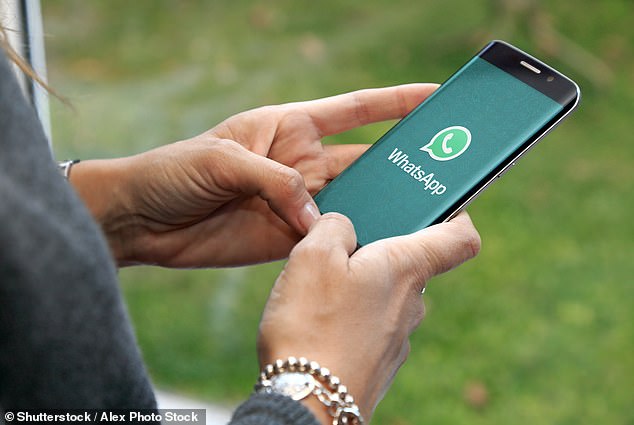
You receive a WhatsApp message on your mobile phone. Your elderly mother’s name flashes up on the screen. She’s out shopping, the message says, and has left her purse at home.
Luckily, she has found an old debit card in her handbag… but there’s barely a penny in the account it’s linked to.
Could you transfer her some money — to be paid back later that day, of course — to cover the cost of a few groceries and filling up the car?


New threat: The ‘son and daughter scam’, is a cruel new twist on the ‘mum and dad scam’ and involves scammers posing as elderly parents in desperate need of cash
It all sounds innocent enough, and many of us wouldn’t hesitate to call our bank or log on to our mobile apps to make the payment right away.
But if you took the bait, it’s highly likely you’d have fallen for the latest con sweeping Britain.
Nicknamed the ‘son-and-daughter scam’, it’s a cruel new twist on a confidence trick exposed by Money Mail over a year ago.
Back then, we revealed that parents were receiving WhatsApp texts — purporting to be from their children — asking for money to cover an unexpected cash crisis. The message would say the child had lost or broken their phone and was using a temporary number.
In fact, these mum-and-dad scam texts were being sent by devious crooks who then supplied fake bank details — and made off with the cash.
Now, criminals are using a similar ploy, except they are pretending the messages come from elderly parents who use mobile phones and may struggle with technology.
Chris Ainsley, head of fraud risk management at Santander, told Money Mail: ‘As the mum-and-dad scam has become better known and less effective, fraudsters are reversing the scenario.
‘The scam itself is more or less the same in nature. They are impersonating someone you know, in the knowledge you are unlikely to give a person in the street money but if it’s family you might. It’s insidious.’
There has been an explosion of ‘family’ scams over the past year.
Three in five impersonation frauds now claim to be from a family member, according to data from High Street bank TSB.
By contrast, just 13 per cent of impersonation scams claim to come from your bank, 4 per cent from the taxman and 4 per cent from online retail giant Amazon.
Cases where family members are used as bait account for 40 per cent of all losses from impersonation scams, TSB says.


Family ties: Three in five impersonation frauds now claim to be from a family member, according to data from high street bank TSB
Santander’s Chris Ainsley adds: ‘It’s all about familiarity. Clearly they make sure you have a specific relationship with whoever they are impersonating.’
Son-and-daughter scam messages seen by Money Mail often say a parent is at the supermarket or a petrol station in desperate need of cash.
Sometimes the texts come from an unknown number, explaining, for example, that your elderly mother has left her handbag at home — her phone and purse included. She is using a friend’s phone while out at the shops. Could you send this friend some money to cover her spending?
In other cases, the message comes through appearing to have arrived from a genuine number stored in your phone for your mother or father. This tactic is known as ‘number spoofing’.
Here, scammers use technology to trick your phone into displaying a name instead of an unknown number as the sender.
Many have already fallen for the deception, messages shared with Money Mail show. One 51-year-old TSB customer handed over £711 after receiving a message from an unknown number claiming to be his dad.
The worried son made a bank transfer to someone he believed was his elderly father in response to the message. It read: ‘Hi, Dad here on new number — hate to ask but could really do with some money this week, can you send us some?’


Warning: There has been an explosion of ‘family’ scams over the past year
And one victim tried to transfer £390 on receiving a message, seemingly from her stepmother, asking to borrow money.
In another example, a worker at Santander received a message on WhatsApp, which appeared to have been sent from ‘Mum’.
The text read: ‘I’m out shopping and brought the wrong card with me. Can you please send me £240? I will pay you back when I get home.’
The scammers provided a sort code and account number, in the hope of duping victims into making a direct transfer.
In another twist on the con, a 31-year-old got a message from a friend saying their father needed help paying his tax and car MOT. Wishing to help a friend in need, they sent £252 to the conmen.
Insiders fear the new twist on the mum- and-dad scam could ensnare an even greater number of victims.
Already, more than half of people in Britain have been targeted by impersonation scams, with the number receiving the texts rising 77 per cent in the year to September 2022, according to Santander.
On average, victims lose £3,808 per swindle.
Friends-and-family scams are one of the biggest fraud problems at banks, warns Paul Davis, director of fraud prevention at TSB.
‘The more emotive the scam, the better for fraudsters,’ he says.
‘They will imitate any family member, including elderly relatives, if they think it increases their chances of exploiting your good intentions by stealing your money.’
Mr Ainsley adds: ‘The real concern is we don’t understand how they are targeting people.
‘We’re in the dark about where they are getting the information.
‘Often, they seem to have an idea of the person they are contacting but they don’t have names.’
Jim Winters, director of economic crime at Nationwide, says fraudsters tend to send out a large number of messages in the hope someone will identify with it.
He says: ‘The trouble is that people who receive these texts forget all sound advice and they immediately think it’s their father, mother, son or daughter. Their first concern is for their family member.’
A spokesman for WhatsApp says the company protects personal messages with end-to-end encryption, which means no one except the sender and recipient has access to those messages, not even WhatsApp.
‘We advise that if you receive a suspicious message (even if you think you know who it’s from), calling or requesting a voice note is the fastest and simplest way to check someone is who they say they are.’
Before sending any money, you should call your family member on the original number you have for them. If you fail to reach them, you can try to call the unrecognised number they are texting you from, says Mr Winters.
Fraudsters will typically find an excuse not to speak over the phone, so look out for this red flag.
Above all, take your time. Fraudsters thrive on causing rush and panic.









